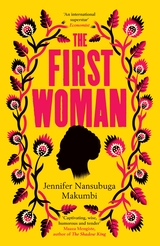The first woman by Jennifer Nansubuga Makumbi

Kirabo, longing to find the mother she has never known, turns to the blind village witch, Nsuuta, to listen to her stories of women's 'original state' a time when they were 'huge, strong, bold, loud, proud, brave, independent.' Kirabo is told that her strange out-of-body experiences are because she still retains some of that original state. She is certainly a unique and determined young person, not easily fobbed off by her elders.
Her life changes when her father finally comes to collect her from her grandparents' place, to take her to live with him. But in his house, Kirabo encounters the 'bitch', her stepmother, a woman who adamantly rejects her.
Kirabo’s quest to find her lost mother sees her caught in repeating generations of struggles between two women, firstly her grandmother and Nsuuta the witch, then her stepmother's rejection of another woman's child, and then Kirabo's own conflicts with her childhood friend Giibwa. Through Nsuuta's stories Kirabo comes to understand that women have been rendered powerless by men, and instead of uniting against that oppression they fight among themselves, like penned hens pecking each other.
This unusual story of a young girl's search for her mother, is entwined with Ugandan folk stories, and set against the threatening background of Idi Amin's murderous rule. But while it reveals women's petty jealousies, it is overwhelmingly a powerful affirmation of the strengths of women to support and care for each other; like water they adapt and flow. If men are of the land, then women are of the sea.
The central question that will keep readers engaged until the end is whether Kirabo is destined to repeat the patterns of the adults around her, or whether she can be strong enough to make her own future. Unlike folk stories, this story has no easy resolution.
Themes: Women, Feminism, Storytelling, Lies, Uganda, Patriarchy.
Helen Eddy